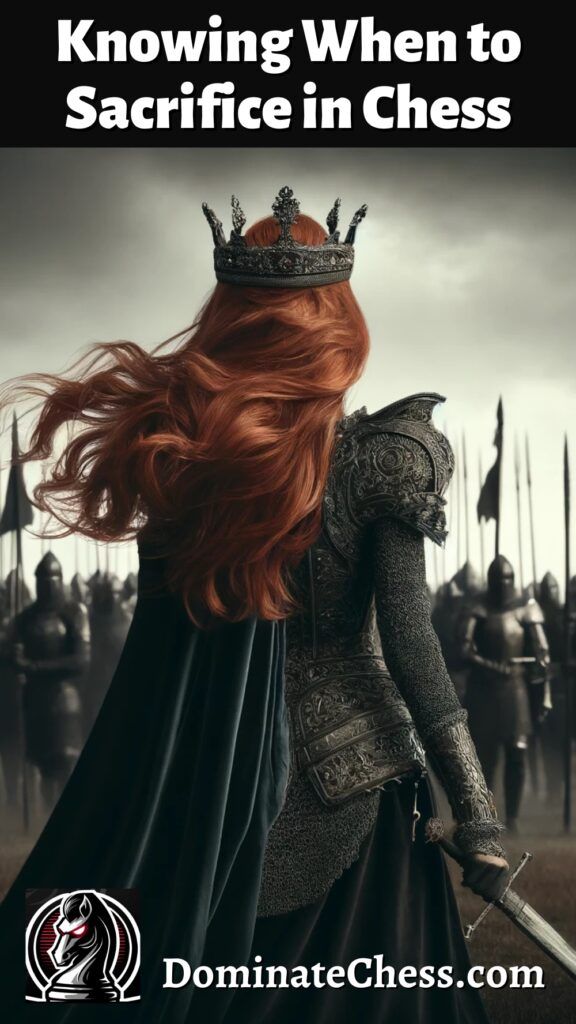Let’s peel back the layers of one of the potential game-changing strategies in chess – the sacrifice. How do you know when to sacrifice? When is the perfect time to unleash this? Are there tells to watch for?
How Do I Know When to Sacrifice in Chess?
To decide when to sacrifice in chess, consider if it disrupts your opponent’s safety, gains you a positional advantage, or significantly accelerates your attack. If so, go for it! It’s a calculated risk and should only be done if you have a clear cut plan.
In chess, sacrificing isn’t just about giving up a piece, it’s about the mix of foresight and strategy that went into making that move.
From my 99 Chess Terms article:
- Sacrifice: In chess, a sacrifice involves intentionally giving up a piece to gain a strategic advantage, like better positioning or a stronger attack. It’s a calculated risk that can lead to a significant payoff.
This is a calculated risk. A well-timed sacrifice not only changes the course of the game but it can also unsettle and psych out your opponent.
Understanding Material Value vs. Positional Advantage
As we all know in chess, not all pieces are created equal. Yes, each piece has a standard point value, but this doesn’t tell the whole story.
Referring again to my 99 Chess Terms to Know article, material value is clear cut: it’s the sum total of the pieces you have on the board. But with the concept of material value comes positional advantage, and it’s a bit more abstract.
Positional advantage refers to the potential power of your active pieces and the control they hold over key squares. We’re talking about the flexibility of your pieces, the safety of your king, and how easily you can launch into an attack or defend against one.
Here’s where initiative comes into play. It’s the ability to make threats and force your opponent to react rather than follow their own plans. When you have the initiative, sometimes sacrificing material can lead to a greater positional edge.
Timing is Everything: Tips for Knowing When to Sacrifice
A well timed sacrifice ALWAYS tends to upend what had been a chill, somewhat methodical game. The whole rhythm of the game changes and an element of chaos enters into frame.
So how do you spot that perfect opportunity? Here are a couple of tips from my personal experience:
- King Safety: Sacrifice material if it significantly exposes or endangers the opponent’s king, potentially leading to a checkmate or winning material back with interest.
- Opponent’s Weaknesses: Sacrifice when it allows you to exploit specific weaknesses in your opponent’s position, such as exposed king, weak back rank, or undefended pieces.
- Initiative Gain: If sacrificing a piece creates a significant gain in tempo or control over the game, it can be worth the material loss. This is especially true if it leads to a strong attack against the opponent’s position.
- Development Advantage: Consider a sacrifice if it helps you develop your pieces while at the same time placing your opponent’s pieces in an uncoordinated or passive position. Opening lines for other pieces to enter the game can be a decisive factor.
- Psychological Impact: A well-timed sacrifice can gain you a psychological advantage to unsettle your opponent, leading to time wastage or errors in judgment under pressure. A near endgame sacrifice can be big, but be careful! Don’t ruin a well played game by losing your advantage in the end!
Don’t sleep on the psychological factors at play in chess. By sacrificing material at the right moment, you can capitalize on your opponent’s uncertainty, forcing them to try to solve complex problems under pressure. This might just steer the game to your advantage.
How to Avoid Blunders: When Not to Sacrifice
Trust me when I tell you that there’s a very thin line separating a brilliant sacrifice from a disastrous blunder. It’s happened to me COUNTLESS times. You need to have a solid understanding of both your position and your opponent’s to avoid giving away the game.
- Not Enough Compensation: Avoid sacrifices if you don’t have clear compensation such as strong attacking chances, significant lead in development, or other major strategic advantages. Material shouldn’t be given up lightly.
- Overestimating Your Position: One of the biggest pitfalls when it comes to sacrificing is being overly optimistic. Make sure your attacking resources truly support your decision, and it’s not just wishful thinking.
- Material Disadvantage: If you are already at a material disadvantage, it’s probably not the time to dig a deeper hole.
- Strong Opponent’s Defense: Don’t sacrifice if your opponent has set up a solid defense that will nullify your sacrifice, leaving you at a material disadvantage. Don’t play into their hand.
- Unclear Plan: Avoid sacrifices that don’t have a clear follow-up plan. If the path to gaining an advantage after the sacrifice isn’t clear in your head, it’s not a justified risk.
- Underdevelopment: Avoid making a sacrifice while your pieces are not fully developed or if the sacrifice doesn’t help in speeding up your development or opening attack lines.
- Stable Opponent’s King Position: If the opponent’s king is secure and well-defended, a material sacrifice aimed at generating an attack could backfire.
- No Surprise Element: If the sacrifice is predictable and your opponent has prepared for it, the sacrifice probably won’t work. Avoid it.
Final Thoughts
Mastering the art of sacrifice can dramatically shift the dynamics of your game. Always make sure any bold moves you make create real opportunities and challenge your opponent strategically. Happy gaming and keep those tactics sharp!
What do you think? Have you had a difficult time knowing when to sacrifice? Have they backfired for you? Have you had game-changing sacrifices that totally won a game? Let me know in the comments section below! I’d love to hear your perspective and I always reply!
Like This Article? Pin It!




Hey Eric,
This is a really insightful article. It’s fascinating to see how strategic sacrifices can dramatically alter the flow of a chess game. Still, a question pops into my mind: In your experience, how does one improve one’s ability to anticipate the consequences of a sacrifice in fast-paced games?
I can’t wait to hear your thoughts about this. And I will be waiting for more articles like this one.
You have to think about the consequences of a sacrifice before you ever think about making it, and then only do it if it’s worth it. This comes with practice 🙂 Thanks for the comment!
Hi Eric,
This is a fantastic article on the art of sacrificing in chess! I particularly appreciated the insights on balancing material value with positional advantage. Your tips on identifying the perfect timing for a sacrifice are incredibly useful. Have you ever had a memorable game where a well-timed sacrifice completely turned the tide? I’d love to hear about it!
David
It happens all the time. A well timed sacrifice will turn the tides 💯 Thanks for the comment!